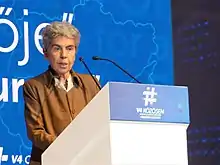
Chantal Delsol (also Chantal Millon-Delsol; born 16 April 1947) is a French philosopher, political historian and novelist. The founder of the Hannah Arendt research institute, founded in 1993, her work is inspired by Julien Freund and Pierre Boutang, as well as by her Catholic faith. She has described herself as a liberal-conservative.
Her main political ideals are centered upon liberalism, federalism, as well as the principle of subsidiarity based on the idea of singularity.
Biography
Chantal Delsol was born into a right-wing Catholic Parisian family, the daughter of biologist Michel Delsol.[1][2] She studied under the liberal-conservative sociologist Julien Freund, a disciple of Max Weber. She earned her docteur ès lettres under him in 1982.
She is currently a professor at Université de Marne-la-Vallée, where she directs the centre for European studies, known as the Hannah Arendt Institute, which she founded in 1993.
Political and philosophical thought
A eulogy for federalism and Europe
Chantal Delsol is a strong supporter of European federalism, an Idea she traces to Catholicism and the baroque culture of Germanic countries. As such, she opposes Jean Bodin's idea of the nation state, which she believes results in geopolitical deadlock. A federation, she argues, is an indeterminate contract based on the common goal of peace and prosperity, offering a greater degree of flexibility and thus a more fluid and open state.
She considers the current European Union not to be a true federation. Due to the lack of political unity in the EU, the only unity is an administrative unity, which she has described as technocratic. For example, Europe lacks a common policy in terms of defence and foreign affairs.[3]
Principle of subsidiarity
For Delsol, subsidiarity is a principle of social organization, allowing for the separation of powers to different authorities. An authority responsible for a group is required to guarantee the existence of the object of the group. The authority is only required to help the group overcome its weaknesses, no more and no less.
Populism
In her book titled La nature du populisme ou les figures de l'idiot !, Chantal Delsol examines the stakes of contemporary populism, i.e. the current resurgence of interest in the concept as well as the need to reevaluate our place in the contemporary world. To Delsol populism appears to be the greatest danger to democracy; on the other hand, it reveals the flaws of western democracies owing to their ideas of universalism.
References
- ↑ Paoli, Paul-François (6 March 2008). "La gauchiste de la famille". Le Figaro. Le Figaro.
Une histoire de famille. « Mon père, Michel Delsol, était biologiste à Lyon, et quand j'étais enfant, il nous emmenait dans son laboratoire, où il disséquait les têtards. » Peu attirée par les petites bêtes, elle apprend la patience et cette passion pour la vérification qui distingue les chercheurs des idéologues. Une forte personnalité, ce Michel Delsol. Un « réac » à l'ancienne, catholique traditionaliste et maurrassien à la fois. Chantal Delsol, qui nous reçoit chez elle, boulevard Saint-Michel, parle de lui avec tendresse et un zeste d'humour. Son père aurait bien voulu qu'elle fût une jeune fille rangée. Mais Chantal, à 20 ans, récuse les valeurs autoritaires de cette lignée qui va de Platon à Maurras en passant par Carl Schmitt, où l'on regarde l'humanité de haut, parfois avec mépris.
- ↑ "Enquête sur "la droite" (2). Chez les Millon, l'esprit de belle-famille. C'est le clan de madame qui a les idées et monsieur qui les expose. - Libération". liberation.fr. Retrieved 2016-04-03.
- ↑ Mouvement Européen - France, « Fondements philosophiques d'une fédération européenne », hebdomadaire, no 8 (d’octobre 1998), lire en ligne